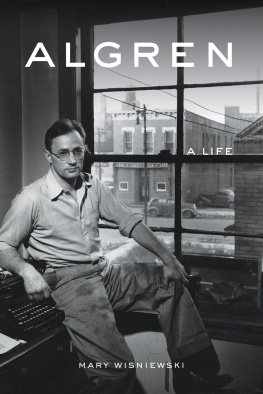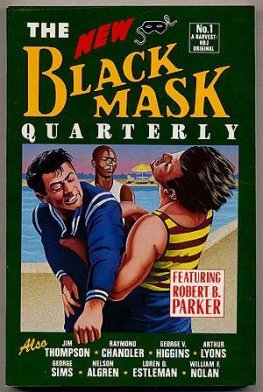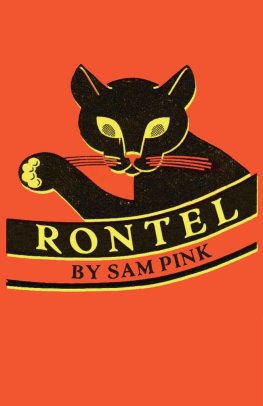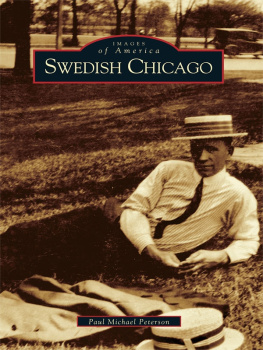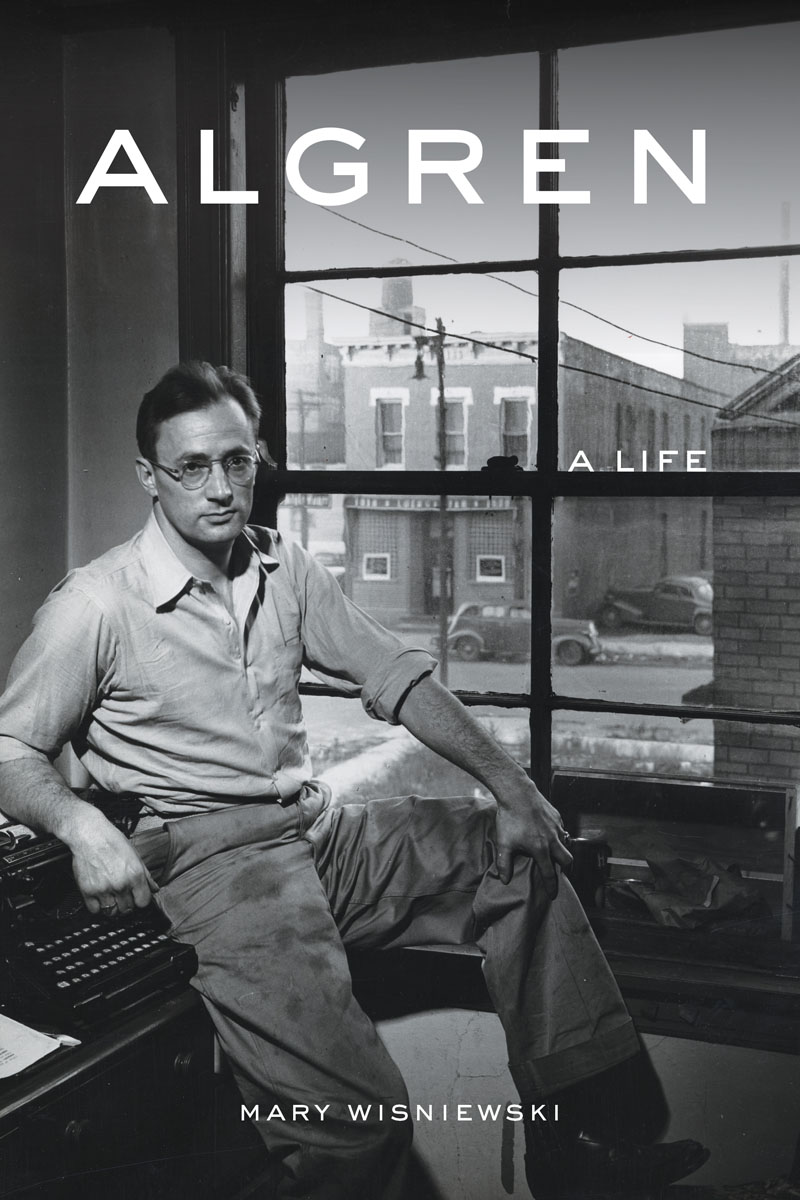
A TIRELESS CHAMPION OF THE downtrodden, Nelson Algren, one of the most celebrated writers of the 20th century, lived an outsiders life himself. He spent a month in prison as a young man for the theft of a typewriter; his involvement in Marxist groups earned him a lengthy FBI dossier; and he spent much of his life palling around with the sorts of drug addicts, prostitutes, and poor laborers who inspired and populated his novels and short stories.
Most today know Algren as the radical, womanizing writer of The Man with the Golden Arm, which won the first National Book Award, in 1950, but award-winning reporter Mary Wisniewski offers a deeper portrait. Starting with his childhood in the City of Big Shoulders, Algren sheds new light on the writers most momentous periods, from his on-again-off-again work for the WPA to his stint as an uninspired soldier in World War II to his long-distance affair with his most famous lover, Simone de Beauvoir, to the sense of community and acceptance Algren found in the artist colony of Sag Harbor before his death in 1981.
Wisniewski interviewed dozens of Algrens closest friends and inner circle, including photographer Art Shay and author and historian Studs Terkel, and tracked down much of his unpublished writing and correspondence. She unearths new details about the writers life, work, personality, and habits and reveals a funny, sensitive, and romantic but sometimes exasperating, insecure, and self-destructive artist.
Copyright 2017 by Mary Wisniewski
All rights reserved
Published by Chicago Review Press Incorporated
814 North Franklin Street
Chicago, Illinois 60610
ISBN 978-1-61373-532-9
Library of Congress Cataloging-in-Publication Data
Names: Wisniewski, Mary, author.
Title: Algren : a life / Mary Wisniewski.
Description: Chicago, Illinois : Chicago Review Press Incorporated, 2017. | Includes bibliographical references and index.
Identifiers: LCCN 2016002793| ISBN 9781613735329 (cloth : alk. paper) |
ISBN
9781613735350 (epub) | ISBN 9781613735343 (kindle)
Subjects: LCSH: Algren, Nelson, 1909-1981. | Novelists, American20th centuryBiography. | Authors, American20th centuryBiography.
Classification: LCC PS3501.L4625 Z95 2017 | DDC 813/.52dc23 LC record available at http://lccn.loc.gov/2016002793
Interior design: Jonathan Hahn
Printed in the United States of America
5 4 3 2 1
To Mitch and Bonny, Lucian and Gabriella, and Frank and Sophie, the kings and queens of old Polonia.
CONTENTS
Index
1
CHILDHOOD DAYS
Take me out for a joy ride
A girl ride, a boy ride,
Im as reckless as I can be,
I dont care what becomes of me.
R EN S HIELDS AND K ERRY M ILLS, T AKE M E O UT FOR A J OY R IDE
Whos yer fayvrut player?
N ELSON A LGREN, C HICAGO: C ITY ON THE M AKE
Nelson Algrens first memory was of getting lost, looking for a hero. He was two and a half. Taking another small boy, he walked up the sidewalks of Detroit in 1911, away from the house where he was born at 867 Mack Avenue, away from his mothers candy store, into the vastness of the booming city, a golden-haired boy in short pants. He was looking for his uncle Theodore, a sailor who had worked on the big boats on the Great Lakes. Nelsons mother, Goldie, who never entertained notions, only convictions, loved to talk about Theodore and her other astonishing brothers. She told how Theodore had gotten into a fistfight with the ships cook on the deck of the steamer Chicora. The captain said one of them had to leave. Theodore was proudhe knew hed work again on one of the thousands of steamers and barges filling the countrys upper Midwest, on Superior and Erie and Michigan, the lake Nelson later referred to as the secondhand sea. So Uncle Theodore shook hands with everybody except the captain, and got off at Benton Harbor, Michigan. On its next trip, in January of 1895, the Chicora left from Milwaukee and sank without a trace beneath Lake Michigans wintry waters. Even a secondhand sea can be a devourer of men.
But this was not the best part of the story, Goldie would insist, speaking from atop a step stool, where she was sponging a wall, or from her knees, scrubbing a floor, her thick, blonde hair frizzing in the heat. The son of a fireman on the Chicora went looking for the wreck in a glass-bottomed boat called the Chicago. But in less than a week the glass-bottomed boat and the firemans son went down too. The glass-bottomed boat story was a bit much, and Algrens father, Gerson, an overburdened working man always waiting to go another shift, had his doubts. He thought the son was a damned fool to follow his father.
Not all the damned fools are at the bottom of the lake, Goldie would snap back. Algrens memories of his parents relationship were mostly of quarrels, the two of them circling round and round the ring, with Goldie forcing Gerson into rhetorical corners, where he would hide, rope-a-dope, behind the evening paper, his lips moving as he read.
But Uncle Theodore was no fool. Nelson urged his companion down one sidewalk after another, past the wooden balloon frame houses of laborers like his father, working for the screw works, or for Packard or Ford. What were the screw works compared to the open water? Goldie had taught contempt of ordinary labor early.
A train came by and the tiny boys waved to the engineer. That was Uncle Theodore, Nelson told his friend, trying out an early gift for improvisation. He was satisfied, but still lost. Everything was so enormous. A Jewish tailor found them and gave them rye bread before calling the police, his many children looking on. Perched on a policemans desk, eating ice cream, Nelson remembered the guns behind the desk, black and mysterious.
Nelson Algren was born on March 28, 1909, in Detroit, as Nelson Ahlgren Abraham to Gerson Abraham and Goldie Kalisher, two Chicago transplants and nonobservant Jews. He was a late baby and only sonhis sister Irene was nine, and his sister Bernice was seven. Gerson was already forty-one, and Goldie thirty-one. Both his parents had come from big families. Besides the heroic Theodore, there was Goldies big brother, Abraham, and little brother, Harry, a sailor on the USS Chicago who had served in the Spanish-American War. He died at age twenty-nine, the year before Nelson was born, becoming the family saint. There were Goldies sisters Hannah and Toby, who on a summer evening used to sing, accompanied by the player piano, in memory of Harry:
My brave boy sleeps in his faded coat of blue
In the lonely grave unknown lies the heart that beats so true
His grandfather, who treated Nelson as a special favorite, showed him how he could blow real smoke through a little wooden clown.
The Kalishers were a prosy family, Nelson remembered. Goldies parents, Louis and Gette, were middle-class German Jews who came from Prussia to Chicago in the nineteenth century, and became embarrassed at the Polish Jews who followed them and looked so Jewish, with their yarmulkes, beards, and prayer shawls. Families like the Kalishers knocked themselves out to repudiate their Jewish roots immediately, Nelson said. As in Germany, They were anxious to become blonde and blue-eyed, which they succeeded in doing. Towheaded Nelson must have pleased them.
German, not lower-class Yiddish, was spoken at Grandpa Kalishers home at 862 North Washtenaw in the West Town neighborhood, where he made red-banded Father & Son cigars and kept a
Next page
